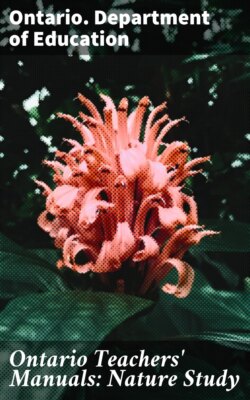Читать книгу Ontario Teachers' Manuals: Nature Study - Ontario. Department of Education - Страница 33
На сайте Литреса книга снята с продажи.
THE SCHOOL GARDEN
ОглавлениеTable of Contents
In the study of garden plants there is added a certain new interest arising out of experimentation, cultivation, and ownership. The love of the gardener has in it elements that the love of the naturalist does not usually possess—a sort of paternal love and care for the plants produced in his garden; but every gardener should be a naturalist as well. Most people have a higher appreciation for that which they own and which they have produced or acquired at some expense or personal sacrifice; therefore it is that the growing of plants in home and school gardens or in pots and window boxes is so strongly advocated throughout this Course. Ownership always implies responsibility, which is at once the chief safeguard of society and the foundation of citizenship. A careless boy will never respect the property of others so much as when he himself has proprietary interests involved. We believe, therefore, that every teacher should encourage his pupils to cultivate plants and, if possible, to own a plot of ground however small.
The teacher should not merely aim at making a garden in the school grounds. The great question is rather how best to use a school garden in connection with the training of boys and girls. To learn to do garden work well is indeed worth while and provides a highly beneficial kind of manual training. To understand something of soils and methods of cultivation, of fertilizers and drainage, the best kinds of flowers, vegetables, fruits, and farm crops, and how to grow them successfully, is very important in such a great agricultural country as this; but the greatest of all results which we may hope to realize in connection with school gardening is the ennobling of life and character. The pupils are taught to observe the growing plants with great care, noting developments day by day. This adds to their appreciation of the beauties and adaptations found among plants on every side, and cannot fail to produce good results in moral as well as in mental development. The teachers must always remember that the gardeners with whom they are working are more important than the gardens which they cultivate.
The best garden is not always the largest and most elaborate one. It is rather the garden that both teacher and pupils have been most deeply interested in. It is the garden in which they have experienced most pleasure and profit that makes them want to have another better than the last. No school is too small to have a garden of some kind, and no garden is too small to become the joy and pride of some boy or girl.
